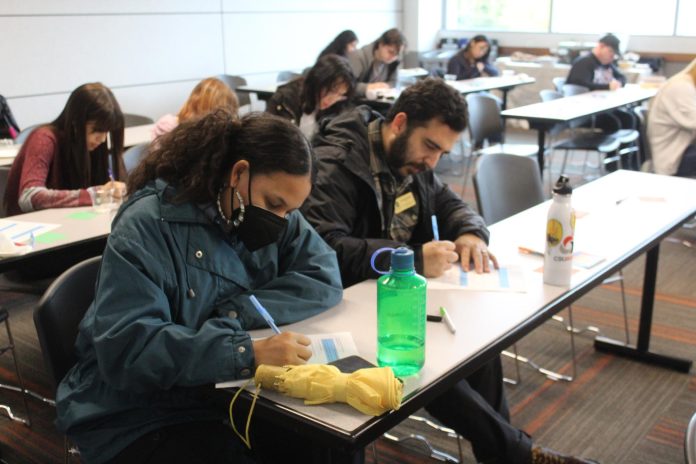Students shared stories of discovering their identities and communities through the “Open Mic: Living Our Truths Showcase” on Wednesday, Nov. 5 in the University Union.
The open mic was hosted as a collaboration between the Sacramento State PRIDE Center and the Asian Pacific Islander Desi American Center.
Hei Fok, the PRIDE Center’s director, was the emcee for the event, guiding the activities and discussion throughout the afternoon. Fok said the purpose of the event was to create a space for those exploring their identity to speak freely.
“One part of college life is for students to not only figure out their interests academically, but also to figure out who they are as individuals,” Fok said. “It’s a moment for any individual to reflect on something that may be misunderstood by other people or something they have to conceal. This might be one place where they can help themselves to alleviate the tension of keeping it to themselves.”
The open mic began with an identity mosaic and reflective discussion, where students wrote their “visible” identities on colored sticky notes and “invisible” identities on white sticky notes.
According to Hire Ventures, invisible identities are characteristics that are not readily seen such as sexual orientation, gender identity, disability and military experience. Visible identities readily seen characteristics such as sex, age and race.
Fok described the intention behind the identity mosaic and allowing students to reflect on how they view themselves.
“Sometimes it’s about trying to mitigate opposing ideas that have been around them. For some, there’s a lot more situations when they have to actively choose whether or not to reveal certain parts of their identity,” Fok said. “My hope was that more people would be more aware of the different ways that we think of ourselves.”

After completing the mosaics and discussing different identities, four student speakers shared their stories about discovering their identities.
Andrew Tran, a second-year English major, was the first speaker during the open mic. Tran discussed how finding allyship on campus saved them from trying to take their own life in January 2025, after struggling with their gender identity.
“Being queer in general is scary because of society,” Tran said. “A deeper layer are the stigmas that all queer people, especially with trans people, are mentally ill or mentally vulnerable.”
Since the open mic was hosted by the PRIDE Center and APIDA Center, Tran said it made them more inclined to speak in front of the audience being Asian and transgender.
“There aren’t a lot of opportunities to share these kinds of personal stories,” Tran said. “It really feels like a safe space because you know that all the hosts of the event are on your side.”
Tran said it felt both exhilarating and scary sharing their story in front of an audience because it was something meaningful to them.
“The opportunities do exist to share stories,” Tran said. “You want to be as prominent as possible, or else we’ll get drowned out.”

Fok said that speakers who were brave enough to share their story could inspire others to do the same.
“It’s important for [people] to hear other perspectives and differences,” Fok said. “It’s evident by some of the presentations that people were inspired by other people sharing.”
Robin Luallin, a second-year English major, attended the event in order to support her friend, Tran. However, her inspiration at the sight of the speakers sharing personal stories prompted her to join in.
“I didn’t actually intend to say anything. I just wanted to silently be there to support. As people were speaking, I was feeling more and more inspired,” Luallin said. “It felt like a community space, a very intimate gathering where I could share those kinds of things and be a more direct version of myself.”
Luallin said she had met a fourth-year student during the open mic who said she never found her community. She said that student is now trying to find her community in her last semester.
“That’s what I think is so great,” Luallin said. “It’s never too late to start finding your community.”



